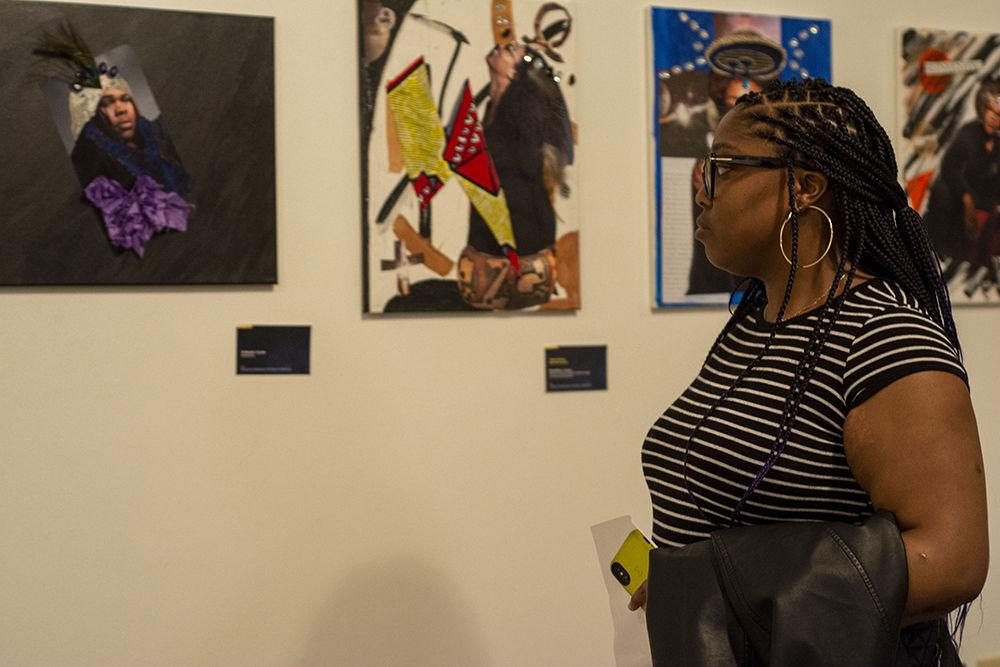
Swathi Karthik
Rasheedah Fletcher, a 2nd year masters student in school counseling, looks at art on display at the Existence as Resistance: The Magic in Blackness exhibit. The exhibit opened on Feb. 18, 2020 in the African American Cultural Center Art Gallery.
Submissions have opened for the Women’s Center spring zine and annual exhibit, titled “Viral Blackness” in collaboration with the African American Cultural Center. This year’s prompt centers around the experiences of Black people in 2020 and encourages Black students to share their stories in the form of photography, poetry, essays and more.
Elizabeth Moran, graduate assistant for the Women’s Center, explains what viral Blackness means to her in the wake of the tumultuous events that have defined 2020.
“For me, the concept of viral Blackness is just how we’ve been trying to make our experiences known,” Moran said. “We have access to so much technology and social media, and it makes it easier than ever to share what is happening in our personal lives.”
This is the fourth year that the Women’s Center has held such an exhibit, and Chaniqua Simpson, program coordinator for the Women’s Center, says that some changes had to be made due to the COVID-19 pandemic.
“We decided that we still wanted to do the exhibit, of course, but the way that we would do it would look a little different,” Simpson said. “We didn’t know what next semester would look like, so that’s why it’s a zine this year.”
In years prior, the Women’s Center would host in-person activities where students could submit the work they created during the workshops. This year may be different, but opening the submissions up to several different mediums turned out to be a beneficial change.
“Last year, the pieces were all the same,” Simpson said. “There was a prompt, then everyone did what they did. We’re trying to take more, different types of submissions. It’s an effect of COVID-19, but I think it’s also kind of fun in a way just to see how people have been documenting their experiences in 2020.”
According to the exhibit’s website, this year’s prompt asks Black students to define viral Blackness and describe how they’ve documented their experiences in 2020. When asked about the current events that inspired this year’s prompt, Moran cites a number of experiences that have impacted the Black community, from the tragic deaths of Black heroes to Cardi B and Megan Thee Stallion’s iconic song “W.A.P.”
“We were talking about some of the losses — Kobe Bryant back in January and, more recently, Chadwick Boseman and then all the things that happened over the summer, with Breonna Taylor and George Floyd,” Moran said. “Talking about all of the losses, and then talking about some other news … some of the more positive, lighthearted things — with the song ‘W.A.P.’, and also finding ways to express ourselves. A lot of that was inspiration and recognizing that it has been a good year and a bad year in a lot of different ways.”
As for the prominence of the word “viral,” Simpson said she took inspiration from the current pandemic to incorporate it into the prompt.
“It wasn’t until I started looking at synonyms of viral that it really made sense to me,” Simpson said. “A lot of it connected with this idea that I wanted people to seek out. I think that the word ‘viral’ has a lot of different meanings, and I like the idea that we can’t be controlled, contained, and that’s where we see the growth of Black Lives Matter and activists coming out and talking about other issues. It means a lot to me.”
Black students and alumni are encouraged to describe what viral Blackness means to them in their submission. The website lists a definition of viral alongside many synonyms, including flourishing, aggressive, amplifying, spreading and more.
“Personally, I think that it’s growth and being and existing,” Simpson said. “I like the word. I think that it’s flourishing, but I also like the word aggressive.”
Black-identifying students and alumni are welcome to submit material on the African American Cultural Center’s website. Submissions are due on Jan. 13, 2021.